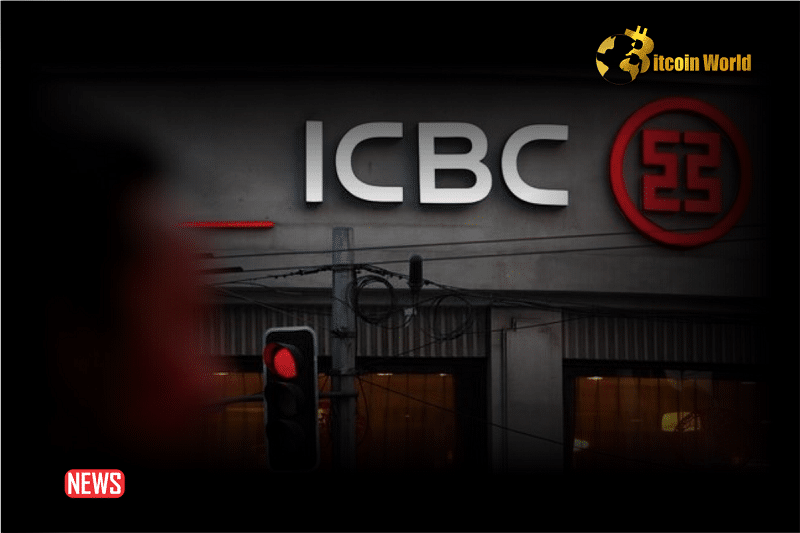Imagine the world’s largest bank, a financial titan, suddenly crippled by a cyberattack. Sounds like a movie plot, right? But this isn’t fiction. Recently, the Industrial and Commercial Bank of China (ICBC), yes, the world’s largest bank, became the target of a significant cyberattack. The result? They had to resort to using… wait for it… USB sticks to keep critical operations running. Let’s dive into this unprecedented situation and understand what it means for cybersecurity and the financial world.
What Exactly Happened at ICBC?
In a nutshell, ICBC was hit with a cyberattack so severe it disrupted their ability to clear US Treasury trades. Think about the sheer volume of transactions a bank like ICBC handles daily – it’s staggering. This attack essentially threw a wrench into their operations, forcing them to find an unconventional, almost archaic, workaround: the humble USB stick.
- Massive Disruption: The cyberattack crippled ICBC’s systems, specifically impacting their U.S. Treasury trade clearing operations.
- USB Stick to the Rescue?: To maintain critical data flow, ICBC employees were seen transferring vital financial information using USB sticks across locations in Manhattan. Talk about a scene straight out of a spy movie!
- Market Ripple Effect: The disruption wasn’t contained within ICBC. It sent shockwaves through the financial markets, forcing other institutions to scramble and reroute deals.
According to a report by Bloomberg, this incident highlights the extreme measures taken to mitigate the damage and ensure some level of operational continuity. It’s a stark reminder that even the most sophisticated institutions are vulnerable.
Read Also: Hackers Force ICBC To Rely on USB Stick to Settle Trades
Who’s Behind This Attack? Enter Lockbit
The finger is pointing towards Lockbit, a notorious ransomware group with alleged ties to Russia. This isn’t their first rodeo. Lockbit has a track record of targeting major organizations globally, including Boeing and the UK’s Royal Mail. They are known for their sophisticated and aggressive tactics, making them a formidable threat in the cybercrime landscape.
Lockbit’s Resume of High-Profile Attacks:
| Organization | Sector | Impact |
|---|---|---|
| ICBC | Financial Services | Disruption of US Treasury trades, forced use of USB sticks |
| Boeing | Aerospace | (Details vary, but significant data breach reported) |
| Royal Mail (UK) | Postal Service | Severe disruption to international shipping services |
Why is This ICBC Attack a Wake-Up Call for Cybersecurity?
The ICBC cyberattack isn’t just another news story; it’s a flashing red light for the entire financial industry and beyond. It underscores the escalating cybersecurity threats and the potential for massive disruption to critical infrastructure.
Key Cybersecurity Takeaways from the ICBC Incident:
- Financial Sector Vulnerability: It highlights how even the largest financial institutions are susceptible to sophisticated cyberattacks. No one is too big to be targeted.
- Systemic Risk: An attack on a major player like ICBC can have cascading effects across the entire financial system, impacting markets and other institutions.
- Need for Enhanced Defenses: This incident serves as an urgent call for all organizations, especially in finance, to drastically strengthen their cybersecurity defenses and incident response plans.
Marcus Murray, founder of cybersecurity firm Truesec, described the incident as a “tsunami” within the financial community. His statement emphasizes the widespread alarm and the urgent need for banks globally to reassess and bolster their security measures.
In response to the attack, ICBC’s headquarters in Beijing initiated emergency discussions with its US division and regulatory bodies. They are even considering seeking assistance from China’s Ministry of State Security, indicating the seriousness with which they are treating this breach.
ICBC officially acknowledged the ransomware attack, confirming that affected systems were isolated. The targeted entity, ICBC Financial Services, is a significant player with substantial assets, further emphasizing the gravity of the situation.
Read Also: China’s Largest Bank’s US Branch Suffers Ransomware LockBit Attack
Ransomware on the Rise in Finance: A Growing Threat
Unfortunately, the ICBC incident is part of a worrying trend. Ransomware attacks in the financial sector are on a steep incline. Cybersecurity firm Sophos reports a significant surge in these attacks in recent years.
Ransomware Attack Statistics in the Financial Sector:
- 2021: 34% of financial institutions reported ransomware attacks.
- 2022: This figure jumped to 55%.
- 2023: A further increase to 64% of financial institutions experienced ransomware attacks.
While the financial sector’s attack rate is slightly below the overall sector average, the rapid increase is alarming. It demonstrates the escalating focus of cybercriminals on lucrative targets like financial institutions.
The good news is that cybersecurity firms observe that financial institutions are increasingly investing in and prioritizing measures to combat these growing cyber threats. However, the ICBC attack serves as a potent reminder that the battle against cybercrime is continuous and requires constant vigilance and adaptation.
Disclaimer: The information provided is not trading advice. Bitcoinworld.co.in holds no liability for any investments made based on the information provided on this page. We strongly recommend independent research and/or consultation with a qualified professional before making any investment decisions.
In Conclusion: A Stark Reminder of the Cyber Risks We Face
The ICBC cyberattack is more than just a technical glitch; it’s a stark illustration of the real and present dangers of cybercrime in our interconnected world. It highlights the vulnerability of even the largest and most sophisticated institutions and the potential for widespread disruption. This incident should serve as a catalyst for усиление (strengthening) cybersecurity efforts across all sectors, not just finance. As cyber threats become more sophisticated, proactive and robust security measures are no longer optional – they are essential for survival in the digital age.
Disclaimer: The information provided is not trading advice, Bitcoinworld.co.in holds no liability for any investments made based on the information provided on this page. We strongly recommend independent research and/or consultation with a qualified professional before making any investment decisions.


